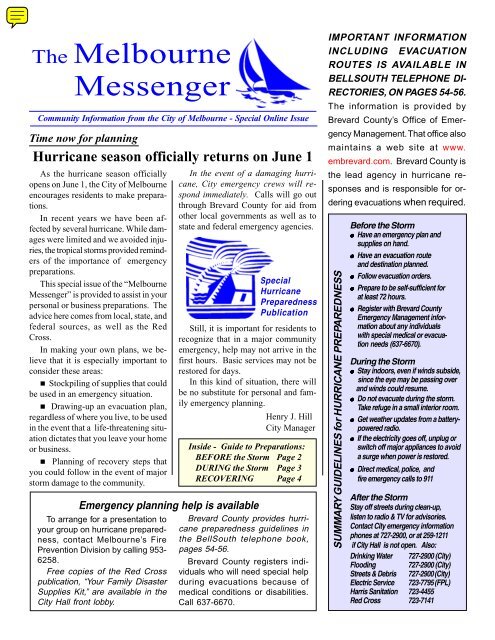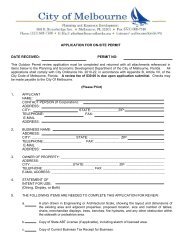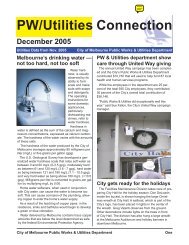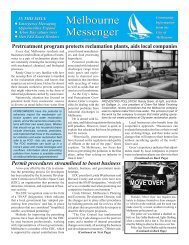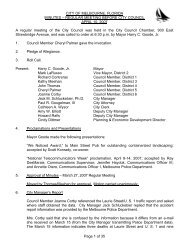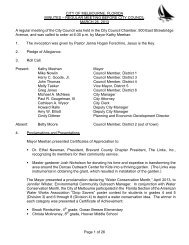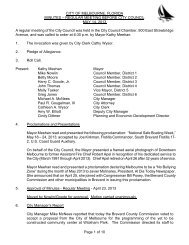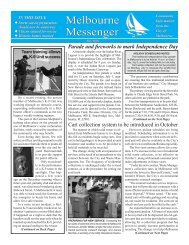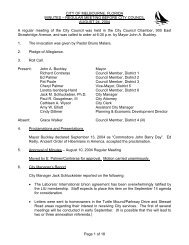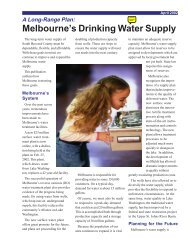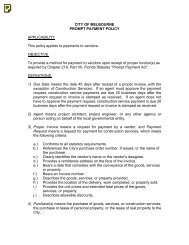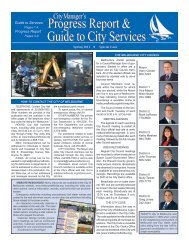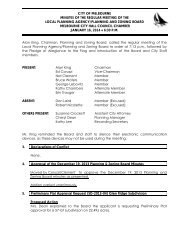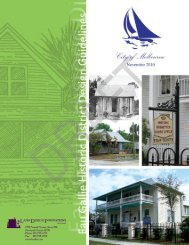Be Prepared! - City of Melbourne, Florida
Be Prepared! - City of Melbourne, Florida
Be Prepared! - City of Melbourne, Florida
You also want an ePaper? Increase the reach of your titles
YUMPU automatically turns print PDFs into web optimized ePapers that Google loves.
The <strong>Melbourne</strong><br />
Messenger<br />
Community Information from the <strong>City</strong> <strong>of</strong> <strong>Melbourne</strong> - Special Online Issue<br />
Time now for planning<br />
Hurricane season <strong>of</strong>ficially returns on June 1<br />
As the hurricane season <strong>of</strong>ficially<br />
opens on June 1, the <strong>City</strong> <strong>of</strong> <strong>Melbourne</strong><br />
encourages residents to make preparations.<br />
In recent years we have been affected<br />
by several hurricane. While damages<br />
were limited and we avoided injuries,<br />
the tropical storms provided reminders<br />
<strong>of</strong> the importance <strong>of</strong> emergency<br />
preparations.<br />
This special issue <strong>of</strong> the “<strong>Melbourne</strong><br />
Messenger” is provided to assist in your<br />
personal or business preparations. The<br />
advice here comes from local, state, and<br />
federal sources, as well as the Red<br />
Cross.<br />
In making your own plans, we believe<br />
that it is especially important to<br />
consider these areas:<br />
n Stockpiling <strong>of</strong> supplies that could<br />
be used in an emergency situation.<br />
n Drawing-up an evacuation plan,<br />
regardless <strong>of</strong> where you live, to be used<br />
in the event that a life-threatening situation<br />
dictates that you leave your home<br />
or business.<br />
n Planning <strong>of</strong> recovery steps that<br />
you could follow in the event <strong>of</strong> major<br />
storm damage to the community.<br />
To arrange for a presentation to<br />
your group on hurricane preparedness,<br />
contact <strong>Melbourne</strong>’s Fire<br />
Prevention Division by calling 953-<br />
6258.<br />
Free copies <strong>of</strong> the Red Cross<br />
publication, “Your Family Disaster<br />
Supplies Kit,” are available in the<br />
<strong>City</strong> Hall front lobby.<br />
In the event <strong>of</strong> a damaging hurricane,<br />
<strong>City</strong> emergency crews will respond<br />
immediately. Calls will go out<br />
through Brevard County for aid from<br />
other local governments as well as to<br />
state and federal emergency agencies.<br />
Special<br />
Hurricane<br />
<strong>Prepared</strong>ness<br />
Publication<br />
Still, it is important for residents to<br />
recognize that in a major community<br />
emergency, help may not arrive in the<br />
first hours. Basic services may not be<br />
restored for days.<br />
In this kind <strong>of</strong> situation, there will<br />
be no substitute for personal and family<br />
emergency planning.<br />
Henry J. Hill<br />
<strong>City</strong> Manager<br />
Inside - Guide to Preparations:<br />
BEFORE the Storm Page 2<br />
DURING the Storm Page 3<br />
RECOVERING Page 4<br />
Emergency planning help is available<br />
Brevard County provides hurricane<br />
preparedness guidelines in<br />
the <strong>Be</strong>llSouth telephone book,<br />
pages 54-56.<br />
Brevard County registers individuals<br />
who will need special help<br />
during evacuations because <strong>of</strong><br />
medical conditions or disabilities.<br />
Call 637-6670.<br />
IMPORTANT INFORMATION<br />
INCLUDING EVACUATION<br />
ROUTES IS AVAILABLE IN<br />
BELLSOUTH TELEPHONE DI-<br />
RECTORIES, ON PAGES 54-56.<br />
The information is provided by<br />
Brevard County’s Office <strong>of</strong> Emergency<br />
Management. That <strong>of</strong>fice also<br />
maintains a web site at www.<br />
embrevard.com. Brevard County is<br />
the lead agency in hurricane responses<br />
and is responsible for ordering<br />
evacuations when required.<br />
SUMMARY GUIDELINES for HURRICANE PREPAREDNESS<br />
<strong>Be</strong>fore the Storm<br />
● Have an emergency plan and<br />
supplies on hand.<br />
● Have an evacuation route<br />
and destination planned.<br />
● Follow evacuation orders.<br />
● Prepare to be self-sufficient for<br />
at least 72 hours.<br />
● Register with Brevard County<br />
Emergency Management information<br />
about any individuals<br />
with special medical or evacuation<br />
needs (637-6670).<br />
During the Storm<br />
● Stay indoors, even if winds subside,<br />
since the eye may be passing over<br />
and winds could resume.<br />
● Do not evacuate during the storm.<br />
Take refuge in a small interior room.<br />
● Get weather updates from a batterypowered<br />
radio.<br />
● If the electricity goes <strong>of</strong>f, unplug or<br />
switch <strong>of</strong>f major appliances to avoid<br />
a surge when power is restored.<br />
● Direct medical, police, and<br />
fire emergency calls to 911<br />
After the Storm<br />
Stay <strong>of</strong>f streets during clean-up,<br />
listen to radio & TV for advisories.<br />
Contact <strong>City</strong> emergency information<br />
phones at 727-2900, or at 259-1211<br />
if <strong>City</strong> Hall is not open. Also:<br />
Drinking Water 727-2900 (<strong>City</strong>)<br />
Flooding 727-2900 (<strong>City</strong>)<br />
Streets & Debris 727-2900 (<strong>City</strong>)<br />
Electric Service 723-7795 (FPL)<br />
Harris Sanitation 723-4455<br />
Red Cross 723-7141
Planning before storm is essential, experts say<br />
Emergency management experts<br />
agree that when a hurricane threatens<br />
<strong>Melbourne</strong>, it will be time for action, not<br />
for planning.<br />
Those responsible for preparing<br />
for hurricanes and for responding to<br />
the damage they can inflict on the<br />
community, urge all residents to<br />
make emergency plans now.<br />
Experts say that numerous factors<br />
should be considered in planning emergency<br />
responses. It is especially important<br />
that area residents consider the<br />
location <strong>of</strong> their homes, the type <strong>of</strong><br />
structures, and personal or family circumstances.<br />
HURRICANE SEASON FACTS<br />
Hurricane scientists set June 1<br />
through Nov. 30 as hurricane season.<br />
Tropical storms which appear this year<br />
will be assigned these names:<br />
Arthur, <strong>Be</strong>rtha, Cristobal, Dolly,<br />
Edouard, Fay, Gustav, Hanna, Isidore,<br />
Josephine, Kyle, Lili, Marco, Nana,<br />
Omar, Paloma, Rene, Sally, Teddy,<br />
Vicky, and Wilfred.<br />
The storm surge is an abnormal rise<br />
in sea level caused by a hurricane. The<br />
storm tide is the combined effect <strong>of</strong><br />
the storm surge and astronomic tide.<br />
Four options are recommended<br />
for consideration:<br />
1. Stay Home? <strong>Be</strong> sure your home<br />
can withstand a hurricane and is on high<br />
ground away from the coast. Evacuate<br />
a manufactured home or a mobile home.<br />
2. Stay With Friends or Relatives?<br />
Make arrangements in advance,<br />
being sure the structure where you will<br />
go is safe and adequately supplied.<br />
Have an alternate plan for use if friends<br />
or relatives are away.<br />
3. Relocate Out <strong>of</strong> the Area?<br />
Know <strong>of</strong>ficial evacuation routes, know<br />
where you are going, and have current<br />
road maps available. Leave early to<br />
avoid traffic, possible flooding, and high<br />
winds.<br />
4. Go To A Public Shelter? Radio<br />
and television broadcasts will announce<br />
the opening <strong>of</strong> shelters by the<br />
Red Cross by <strong>Melbourne</strong> residents.<br />
Prepare a list ahead <strong>of</strong> time for essential<br />
and comfort items to take with you to a<br />
shelter, including medicines, valuable<br />
papers, and a three-day supply <strong>of</strong> food<br />
and water for every person evacuated.<br />
Activities or reading material are also<br />
advisable.<br />
Most <strong>Melbourne</strong> residents who<br />
want to use public shelters are asked<br />
by Brevard County to report to “primary<br />
evacuation shelters” in the<br />
city.<br />
Brevard County is responsible for<br />
ordering evacuations. A hurricane<br />
evacuation typically is aimed at removing<br />
residents from the most dangerous<br />
areas: the barrier island, mobile homes,<br />
and low-lying areas.<br />
Public shelters are provided for residents<br />
who are unable to find shelter<br />
elsewhere. When a primary shelter is<br />
full, newcomers will be directed to another<br />
facility that has been opened by<br />
the Red Cross to handle the overflow.<br />
If the area is threatened by a hurricane<br />
<strong>of</strong> “Category 3” intensity or greater,<br />
Brevard County Emergency Management<br />
plans to recommend an evacuation<br />
<strong>of</strong> the county.<br />
Steve <strong>Be</strong>nn, who coordinates the<br />
shelter program for Brevard County<br />
Emergency Management, said that<br />
in the higher intensity storms those<br />
evacuating from the barrier islands<br />
will be encouraged to leave the<br />
county altogether for shelter.<br />
However, <strong>Be</strong>nn said that the Red<br />
Cross shelters in <strong>Melbourne</strong> and elsewhere<br />
will still be opened.<br />
Planning for a place where pets can<br />
weather a hurricane should take into account<br />
that animals are not allowed at public<br />
shelters. Guide dogs are exceptions to<br />
that rule.<br />
Emergency <strong>of</strong>ficials encourage pet<br />
owners to take their pets with them if they<br />
are evacuating the area.<br />
It is strongly recommended that you<br />
make prior arrangements to shelter pets<br />
with a commercial kennel, family, or friends<br />
outside <strong>of</strong> the evacuation area.<br />
If pets must be left at homes, emergency<br />
<strong>of</strong>ficials recommend they be inside<br />
MONEY or TRAVELERS CHECKS?<br />
<strong>Melbourne</strong> Police recommend that<br />
residents consider having an adequate<br />
supply <strong>of</strong> travelers checks on<br />
hand during the hurricane season to<br />
cover emergency situations.<br />
While travelers checks may provide<br />
less convenience than cash,<br />
police note that carrying large<br />
amounts <strong>of</strong> cash can be unsafe.<br />
Getting any kind <strong>of</strong> currency in the<br />
days immediately following a hurricane<br />
impact can be difficult or impossible.<br />
Storm damage can prevent banks<br />
from opening. Power outages can<br />
disable automated teller machines.<br />
Special<br />
Hurricane<br />
<strong>Prepared</strong>ness<br />
Publication<br />
Flood insurance recommended<br />
Federal flood insurance provides coverage<br />
to protect homes and belongings<br />
from damage caused by rising water.<br />
Local insurance agents can provide<br />
information about policies for<br />
homeowners and businesses through the<br />
National Flood Insurance Program.<br />
Federal <strong>of</strong>ficials note that homeowner<br />
policies do not include flood coverage.<br />
They also note that, “you do not have<br />
to live near the water to become a flood<br />
victim.”<br />
PETS ALSO NEED STORM PLANS AND CANNOT ENTER PUBLIC SHELTERS<br />
in “safe” areas where they can escape rising<br />
water, with dogs and cats separated.<br />
Brevard County Animal Shelters will be<br />
open, unless ordered evacuated, and will<br />
receive pets on an emergency basis. It is<br />
very important that pets be accompanied<br />
by current rabies certificates, medications,<br />
and food. For more information<br />
call 259-3400.<br />
If all shelters are full, the <strong>Melbourne</strong><br />
Greyhound Park at 1100 N. Wickham Road<br />
has volunteered its facility as a temporary<br />
pet shelter to serve people from evacuation<br />
areas only.
Evacuation procedures are updated<br />
Brevard County has established the following evacuation<br />
procedure for <strong>Melbourne</strong> residents and others who must find<br />
shelter away from home during a hurricane.<br />
By state law, Brevard County issues evacuation orders and<br />
also issues orders allowing residents to return to their homes<br />
when the emergency has passed. <strong>City</strong> law enforcement and fire<br />
department personnel assist in the evacuations.<br />
Designated as evacuation routes are major east-west highways,<br />
along with the causeways, Highway A1A, and U.S. 1.<br />
The map at right indicates evacuation routes in blue.<br />
Persons who wish to evacuate to public shelters are<br />
asked to use the following plan:<br />
■ All mainland <strong>Melbourne</strong> residents who live north <strong>of</strong><br />
Aurora Road are asked to evacuate to I-95 or seek public shelter<br />
at the Brevard Community College (BCC) campus at 3865 N.<br />
Wickham Road.<br />
■ Mainland residents who live between Aurora Road and<br />
U.S. Highway 192 are to evacuate westward or seek public<br />
shelter at the Eau Gallie High School auditorium, 1400 Commodore<br />
Blvd. <strong>Melbourne</strong> residents on the barrier island may also<br />
report to Eau Gallie High School for shelter.<br />
■ Those living south <strong>of</strong> U.S. Highway 192 are to evacuate<br />
westward or report to Riviera Elementary School, 351 Riviera<br />
Drive NE, in Palm Bay.<br />
Brevard County emergency <strong>of</strong>ficials ask that residents use<br />
the public shelters only as a last resort, when it is not possible<br />
to evacuate to a home or motel out <strong>of</strong> the area.<br />
Those using the public shelters are asked to bring food,<br />
water, bedding, and medicines.<br />
Complete evacuation guidelines from Brevard County are<br />
included in the Southern <strong>Be</strong>ll telephone directory, pages 54-56.<br />
(RIVIERA ELEMENTARY<br />
SCHOOL IN PALM BAY)<br />
EVACUATIONS are ordered<br />
long before a hurricane arrives,<br />
since flooding can<br />
block roadways well in advance<br />
<strong>of</strong> a storm’s arrival.<br />
First evacuations are typically<br />
from the barrier island,<br />
mobile homes, and<br />
flood prone areas.<br />
STORM ASSISTANCE<br />
Major highways serve as evacuation routes. Locations<br />
where residents will report for assignments to<br />
public shelters are indicated as squares.<br />
Also, the locations <strong>of</strong> aid stations that will be activated<br />
to help victims after a major hurricane impact are shown<br />
as circles.<br />
<strong>Melbourne</strong> goes on alert in response to hurricane threats, provides information and aid<br />
As a hurricane approaches, the <strong>City</strong> <strong>of</strong><br />
<strong>Melbourne</strong> takes steps to weather the storm and<br />
to assist the community with recovery.<br />
During the hurricane season, departments<br />
are given daily updates on any tropical storms<br />
STORM CATEGORIES<br />
Tropical Depression - winds <strong>of</strong> 39 mph<br />
Tropical Storm - winds to 73 mph<br />
Category 1 Hurricane - winds to 95 mph, storm<br />
surge to 5 ft, wind and water damage.<br />
Category 2 Hurricane - winds to 110 mph,<br />
storm surge to 8 ft, structure damage, flooding.<br />
Category 3 Hurricane - winds to 130 mph,<br />
storm surge to 12 ft, large trees down, flooding.<br />
Category 4 Hurricane - winds to 155, storm<br />
surge to 18 ft, heavy damage, flooding.<br />
Category 5 Hurricane - winds above 155 mph,<br />
storm surge 18 ft, buildings destroyed, flooding.<br />
in the Atlantic. <strong>City</strong> works go on alert when a<br />
hurricane threatens <strong>Melbourne</strong>.<br />
As a storm approaches, an emergency<br />
telephone information center will be activated<br />
at <strong>City</strong> Hall. To get updated information<br />
on storm preparations, residents can call<br />
727-2900 or additional telephone numbers announced<br />
through news outlets.<br />
The <strong>City</strong> will also assist with any evacuations<br />
ordered by Brevard County. At the direction <strong>of</strong><br />
the County, the Red Cross will open local shelters.<br />
<strong>City</strong> Activates Emergency Center<br />
<strong>Be</strong>fore a storm impacts <strong>Melbourne</strong>, the <strong>City</strong><br />
will activate an Emergency Operations Center<br />
(EOC) at a <strong>Melbourne</strong> Police Department facility<br />
on Babcock Street.<br />
It is from the EOC that emergency operations<br />
will be directed during and following the<br />
storm. Immediately after a storm, police and<br />
fire department personnel will begin assisting<br />
residents. Everyone is encouraged to avoid<br />
travel as <strong>City</strong> workers begin clearing streets.<br />
If the situation warrants it, a half-dozen<br />
Emergency Aid Stations will be activated to provide<br />
direct assistance to residents. The effort<br />
should put first aid, shelter, and food within<br />
walking distance <strong>of</strong> <strong>Melbourne</strong> homes.<br />
However, emergency <strong>of</strong>ficials say anyone<br />
who is safe in their home should stay<br />
inside immediately after the storm.<br />
Rescue workers will go into damaged neighborhoods<br />
to search for people who need assistance.<br />
Individuals who need to notify emergency<br />
crews about medical emergencies after the<br />
storm passes may have to flag down rescue<br />
teams if telephone contact is not possible.
Recovery activities aided by community’s cooperation<br />
The cooperation <strong>of</strong> everyone in the<br />
community will be required during recovery<br />
from the impact <strong>of</strong> a major hurricane,<br />
emergency <strong>of</strong>ficials say.<br />
When Hurricane Erin’s record-setting<br />
rains left standing water in some residential<br />
areas, many homes remained dry until<br />
motorists drove through standing water<br />
at fast speeds. The resulting wakes<br />
pushed water into the homes.<br />
“There is a real need for cooperation<br />
by everyone during emergency periods,”<br />
notes <strong>City</strong> Manager Henry J. Hill.<br />
Evacuations & Returns<br />
Hill said that Brevard County must put<br />
citizen safety first in calling for both<br />
evacuations or allowing a return to evacuated<br />
areas.<br />
He noted that following Hurricane Erin<br />
some residents were unhappy with delays<br />
in reopening <strong>of</strong> the causeways.<br />
“Brevard County has a responsibility<br />
to determine that the beach areas or other<br />
evacuation areas are safe before reopening<br />
them,” Hill said.<br />
“While we encourage the County to<br />
reopen the causeways just as quickly as<br />
possible, we understand the need for the<br />
delay,” said Hill. “We ask that the residents<br />
be as patient as possible.”<br />
Repair Cautions<br />
One post-hurricane problem that has<br />
been experienced in other areas is the<br />
appearance <strong>of</strong> phony contractors who will<br />
accept money for repairs and then vanish,<br />
said Fire Chief Walt Chamberlin.<br />
The MELBOURNE MESSENGER<br />
A publication <strong>of</strong> the<br />
<strong>City</strong> <strong>of</strong> <strong>Melbourne</strong><br />
900 E. Strawbridge Ave.<br />
<strong>Melbourne</strong>, FL 32901<br />
If a hurricane causes extensive damage,<br />
Chief Chamberlin said the <strong>City</strong> will<br />
Special<br />
Hurricane<br />
<strong>Prepared</strong>ness<br />
Publication<br />
require that contractors register with the<br />
<strong>City</strong>. Each will be issued a badge indicating<br />
that they are registered.<br />
In dealing with any storm repairs,<br />
Chamberlin recommends that home or<br />
business owners get information including<br />
a contractor’s business license number<br />
and a driver’s license number.<br />
Water Supply<br />
Immediately after a hurricane, residents<br />
should be wary <strong>of</strong> drinking water<br />
contamination until told that the supply<br />
is safe, said Bob Klaproth, Water and<br />
Wastewater Administrator for the <strong>City</strong>.<br />
Caution dictates that residents boil or<br />
otherwise treat drinking water until assured<br />
that is is safe for consumption,<br />
Klaproth said.<br />
An announcement that the water supply<br />
is safe will be issued as soon as is<br />
practical following a hurricane, he noted.<br />
Internet users can find links<br />
to weather sites at http://<br />
www.melbourneflorida.org<br />
Mayor - John A. Buckley. Vice Mayor - Loretta Hand. Council Members:<br />
Richard Contreras, Ed Palmer, Pat Poole, Grace Walker, and Cheryl Palmer.<br />
Henry J. Hill, <strong>City</strong> Manager. Michael Moore, Editor. (321) 953-6282.<br />
Internet Pages: http://www.melbourneflorida.org<br />
E-Mail: cityhall@melbourneflorida.org<br />
<strong>Be</strong> <strong>Prepared</strong>!<br />
Brevard County’s Office <strong>of</strong> Emergency<br />
Management provides extensive information<br />
on how to prepare for the hurricane<br />
season, on evacuations, and on how to<br />
survive tropical storms, at its Internet web<br />
pages (at www.embrevard.com). <strong>Be</strong>low are<br />
recommended steps to take in preparation for<br />
hurricane threats.<br />
● Keep home in good repair. Tack down<br />
loose ro<strong>of</strong>ing and siding. Trim dead or<br />
broken branches from trees.<br />
The experts agree that homes can<br />
survive a hurricane's fury if a few relatively<br />
minor improvements, such as bracing the<br />
gable ends <strong>of</strong> ro<strong>of</strong>s, are made. Contact<br />
your builder, a pr<strong>of</strong>essional engineer,<br />
licensed contractor, or architect to inspect<br />
your home for structural integrity.<br />
● Make plans and purchase materials<br />
to secure your home before the storm<br />
threatens (plywood, shutters, and/or<br />
protective window film; plastic sheeting,<br />
nails, etc.).<br />
● Purchase a battery-powered weather<br />
alert radio.<br />
● Inventory your property (a video tape<br />
is excellent) and store the information with<br />
insurance papers in a safe place (such as<br />
safety deposit box) or send a copy to a<br />
relative out <strong>of</strong> the area.<br />
● Make sure your address (number) is<br />
clearly marked on your home.<br />
● Review your insurance policies<br />
with your agent now. Do you have<br />
homeowner's and flood insurance?<br />
Homeowner's insurance does not cover<br />
damage to your home or belongings caused<br />
by flooding. Flood insurance is available<br />
through an insurance agent or broker. If your<br />
home is substantially damaged (50% or<br />
greater), you will be required to rebuild to<br />
existing codes, which may mean elevating<br />
the structure. Will you be covered?<br />
● Homeowners and tenants - are your<br />
contents and personal belongings covered?<br />
Will your insurance cover replacement<br />
costs?


